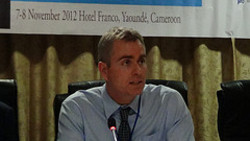International Land Coalition | 22 March 2012

by Mike Taylor, Programme Manager Global Policy and Africa, ILC
There is a lot that we don’t know about the nature and scale of the global rush for land resources. But the evidence that we have – from on-going global monitoring efforts such as the Land Matrix, from the growing body of research, and from reports of our members and others from the ground – shows clearly that commercial pressure on land has greatly increased in the past few years.
This allows debate and effort to focus more on (i) how to prevent land grabbing, and (ii) how to enable forms of land-based investments that actually bring real benefit. These are huge challenges, and on which many positions are taken. Such positions rest on wider questions such as the functioning of rural societies, territorial governance, the value of local eco- and food systems, and the role local food producers (including smallholders, indigenous peoples, fisherfolk and pastoralists) should play in feeding the world of the future.
A large proportion of ILC members work directly in support of rural communities. Among these members, in particular, there is strong agreement on the urgency of reversing decades of neglect to support efforts by rural food producers to themselves be the best investors in land resources.
International members of ILC such as IIED, IFAD and CIRAD are contributing to understanding how external investors could partner with smallholders to bring real benefit, while respecting – and strengthening - their land rights. Farmer federations such as EAFF are investigating investment models that their members would support. Local organisations such as Pakisama in the Philippines are demonstrating how small farmers can improve production on their own land and compete effectively. It is also clear that badly-designed alternative investment models can also be equally damaging to smallholders as those that dispossess them of their land. At the same time, many government agencies in agrarian economies do not share a vision of smallholder farming as a key pillar of agricultural investment, and thus provide little protection or support to smallholders.
When ILC members meet in Guatemala 22-26 April for the Global Land Forum, this is one topic they will explore. A panel that brings together activist, smallholder, government and private sector perspectives will debate these challenges. The outcomes will be considered as part of the closing panel and will be captured in the Antigua Declaration as a means to guide the work of ILC members into the future. Many questions will remain, but what we do know and can agree on can galvanise and direct the urgent action that is needed.

With the largely self-evident agreement that land grabbing is wrong and all efforts should be made to prevent it, debate and effort can focus more on (i) how to prevent land grabbing, and (ii) how to enable forms of land-based investments that actually bring real benefit, says the ILC's Michael Taylor
by Mike Taylor, Programme Manager Global Policy and Africa, ILC
There is a lot that we don’t know about the nature and scale of the global rush for land resources. But the evidence that we have – from on-going global monitoring efforts such as the Land Matrix, from the growing body of research, and from reports of our members and others from the ground – shows clearly that commercial pressure on land has greatly increased in the past few years.
This allows debate and effort to focus more on (i) how to prevent land grabbing, and (ii) how to enable forms of land-based investments that actually bring real benefit. These are huge challenges, and on which many positions are taken. Such positions rest on wider questions such as the functioning of rural societies, territorial governance, the value of local eco- and food systems, and the role local food producers (including smallholders, indigenous peoples, fisherfolk and pastoralists) should play in feeding the world of the future.
A large proportion of ILC members work directly in support of rural communities. Among these members, in particular, there is strong agreement on the urgency of reversing decades of neglect to support efforts by rural food producers to themselves be the best investors in land resources.
International members of ILC such as IIED, IFAD and CIRAD are contributing to understanding how external investors could partner with smallholders to bring real benefit, while respecting – and strengthening - their land rights. Farmer federations such as EAFF are investigating investment models that their members would support. Local organisations such as Pakisama in the Philippines are demonstrating how small farmers can improve production on their own land and compete effectively. It is also clear that badly-designed alternative investment models can also be equally damaging to smallholders as those that dispossess them of their land. At the same time, many government agencies in agrarian economies do not share a vision of smallholder farming as a key pillar of agricultural investment, and thus provide little protection or support to smallholders.
When ILC members meet in Guatemala 22-26 April for the Global Land Forum, this is one topic they will explore. A panel that brings together activist, smallholder, government and private sector perspectives will debate these challenges. The outcomes will be considered as part of the closing panel and will be captured in the Antigua Declaration as a means to guide the work of ILC members into the future. Many questions will remain, but what we do know and can agree on can galvanise and direct the urgent action that is needed.













